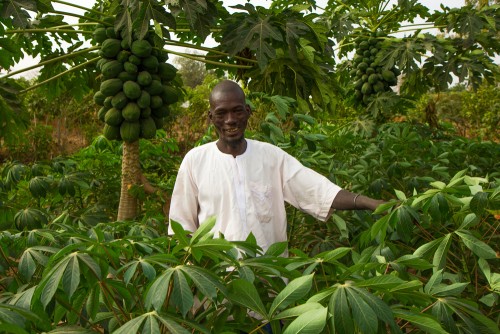 Decades of backbreaking subsistence farming had left Malik Ndao and his family hungry and hopeless. He struggled for years, but the barren land with dying soils never produced enough to feed his children. Now he has a brighter future. His life is filled with joy and hope. Through his hard work in a Forest Garden, he provides a better life for his family.
Decades of backbreaking subsistence farming had left Malik Ndao and his family hungry and hopeless. He struggled for years, but the barren land with dying soils never produced enough to feed his children. Now he has a brighter future. His life is filled with joy and hope. Through his hard work in a Forest Garden, he provides a better life for his family.
Overcoming Hardships
Malik and his wife have five children. Their farm never provided enough to feed the family. He was often away for months, desperately trying to make additional money to feed his family.
 He would search for work in markets across Senegal, attempting to earn tips by pushing wheelbarrows and carrying boxes. Occasionally, hunger drove him to raid the local forest for wood and fruit to gather anything he could eat or sell. He was barely surviving, with no chance to dream of a better life.
He would search for work in markets across Senegal, attempting to earn tips by pushing wheelbarrows and carrying boxes. Occasionally, hunger drove him to raid the local forest for wood and fruit to gather anything he could eat or sell. He was barely surviving, with no chance to dream of a better life.
A New Beginning with Trees for the Future
Then, three years ago, Malik and his wife began their Forest Garden project with Trees for the Future. Today, their Forest Garden System has 2,463 trees, yielding something of value to trade or sell every day of the year.
Malik no longer feels desperate and hopeless. He stays in his village and spends time with his family. Now his family, including his mother, wife, and five children, are well-fed.

Success Beyond Imagination
Last year, their two-acre Forest Garden generated over $1,260 – five times more than what maize and peanut farmers earn from the same amount of land. Malik is achieving something he never dreamed of: saving money for the future.
Scaling up?  But there are many others like Malik we can help feed their families and build a future filled with promise and hope. 90% of his neighbors and friends are still skipping meals and chronically worried they won’t have enough to eat.
But there are many others like Malik we can help feed their families and build a future filled with promise and hope. 90% of his neighbors and friends are still skipping meals and chronically worried they won’t have enough to eat.
“I thank you to the point of wanting to dance!” says Malik.
Together we can make many more families dance.
Since 1989 Trees for the Future’s (TREES) has strived to improve the livelihoods of impoverished farmers through revitalizing degraded lands. We work at the intersection of poverty alleviation and sustainable agriculture. Primarily, we accomplish our mission by teaching our Forest Garden program for growing food and increasing incomes throughout to impoverished farming communities in East and West Africa.
